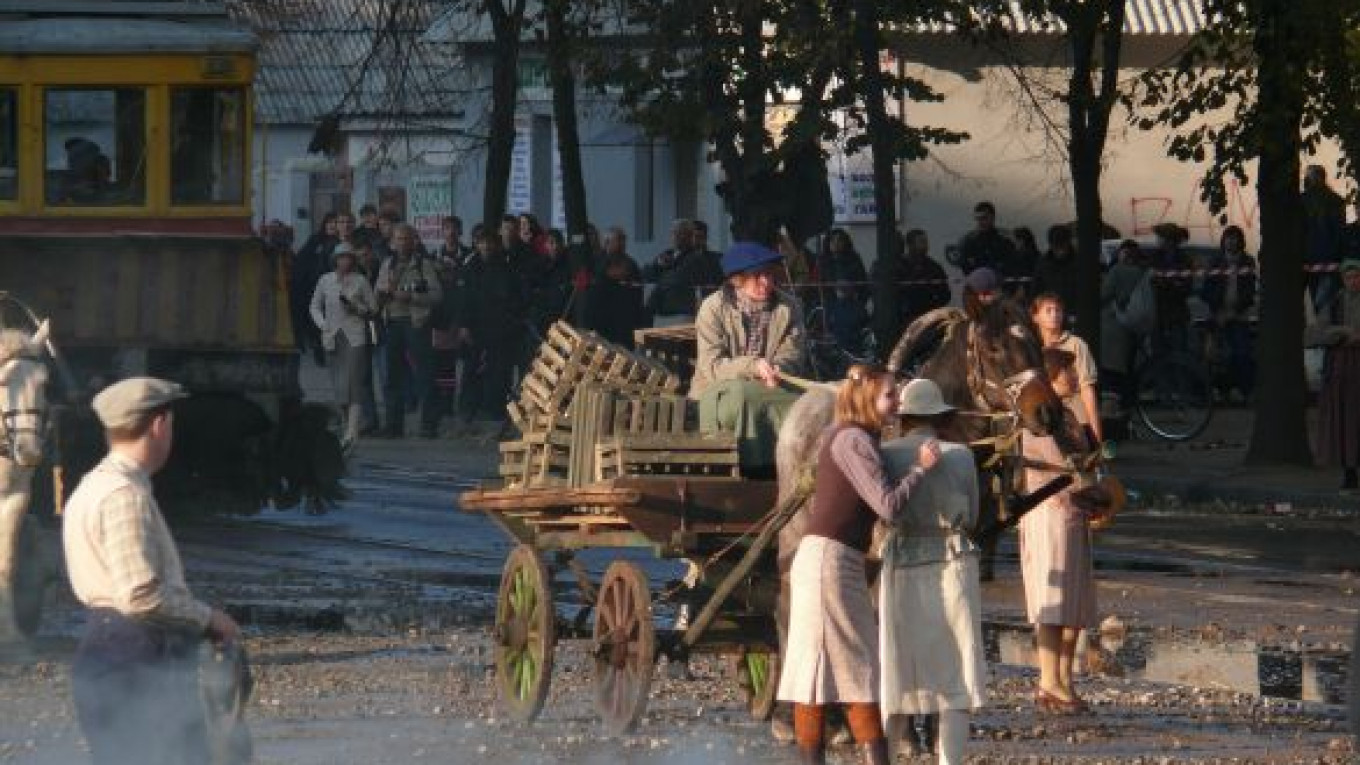In a replica of 1930s Moscow raised outside the Ukrainian city of Kharkov, a boyish filmmaker and his comrades worked for five years to recreate Soviet life.
Yet "Dau" director Ilya Khrzhanovsky's forthcoming exploration of the life of Soviet physicist Lev Landau remains in postproduction.
Khrzhanovsky, a cherubic native of Moscow's cultural elite and son of noted film director Andrei Khrzhanovsky, won interest and funding for "Dau" in 2006 at the Cannes Film Festival's Atelier, a marketplace for new projects. His bizarre and enigmatic film "4," released the previous year, had marked him as one of Russia's most promising young filmmakers.
For his collaborators, Khrzhanovsky selected similarly self-willed, iconoclastic figures. The film's screenwriter, experimental novelist Vladimir Sorokin, whose graphic, stylized prose has made him an enfant terrible of literary Russia, had also worked with Khrzhanovsky on "4."
In the role of the Russian-Jewish scientist Landau, Khrzhanovsky cast Greek-born conductor Teodor Currentzis, a controversial figure with a Byronic visage and a tendency to make statements like, "I will save classical music."
Landau himself was a restless nonconformist. His life — which included free love, a year in the gulag and great advances in condensed matter physics — boldly contrasted with the norms of both the Soviet and scientific elite. He won the Nobel Prize in physics in 1962, but his career ended shortly after because of complications from a car accident that ultimately contributed to his death six years later.
Khrzhanovsky worked on recreating Landau's life with a largely foreign crew, including an all-star cadre of international cinematographers featuring Lol Crawley, "Four Lions," Jürgen Jürges, "Ali: Fear Eats the Soul," and Manuel Alberto Claro, "Melancholia." Eschewing professional actors, he filled out the cast with locals, intellectuals and artists, such as American theatre director Peter Sellars and Mikhail Fichtengoltz, a critic and official at the Bolshoi Theater.
The filmmakers appeared to disappear almost entirely into the self-enclosed society that was created for the shoot. The film's set, which came to be known as "The Institute," became a cult of historical verisimilitude, in which modern clothing was banned and period-appropriate music poured from a wide-ranging speaker system. Khrzhanovsky was "constantly talking into the radio and making decisions about the film," said Julia Panina, a Kharkov local who joined the film for a crowd scene but stayed on to perform a number of small roles.
During one large crowd scene, Panina described an instance in which extras "tried to see the camera or look at the camera operator out of interest and curiosity." In order to preserve the scene's realism, the director "cunningly took a few dozen takes, exhausting us so that by evening we were too tired to want to look anywhere." Officially, shoots were liable to last 24 hours a day.
"Modern items such as cell phones, cameras, modern cigarettes and lighters were indeed banned," said Veronika Bulyanskaya, another extra and Kharkov resident. "But I could just hide them under my cap."
Nevertheless, Panina insisted that actors were well-fed and that the filmmakers maintained a good relationship with the locals. Despite the production's mad social science trappings, she said that "the atmosphere on set was generally amiable."
"I will probably never find myself in such a situation ever again," Bulyanskaya said. "Now people are different, meaner; on the set everyone was kindhearted, they smiled and helped one another. Girls were so beautiful without make-up, provocative outfits or short skirts."
Production, originally planned to last seven weeks, dragged on from 2006 to 2011, as the budget ballooned from $3.5 million to an estimated $10 million. The shoot ended in 2011 with a massive celebration.
Nevertheless, the process of turning five year's worth of footage into an attractive night at the movies remains incomplete. In 2012, the Russian Culture Ministry demanded that the filmmakers complete the film by 2013, as part of a wider attempt to draw concrete results from projects subsidized with state money. Similarly, many film enthusiasts were hopeful that the film might appear at this May's Cannes Film Festival.
While both parties may have been disappointed for the time being, postproduction is under way. The film's production company, Phenomen Films, says postproduction is taking place in London. A large team of accomplished British editors will be responsible for completing what has now been deemed "the Dau project." According to an early news release, the finished film should run about two hours long but is not likely to appear until next summer at the earliest.
Phenomen Films declined a request for an interview for this article. Coproduction Office, the French sales company that has been handling "Dau," decided not to give any interviews.
"Dau's" production may indeed mirror the subject matter of the film itself, which Khrzhanovsky has said is "about how to live with a genius, how to love a genius, how to tolerate a genius."
Contact the author at artsreporter@imedia.ru
A Message from The Moscow Times:
Dear readers,
We are facing unprecedented challenges. Russia's Prosecutor General's Office has designated The Moscow Times as an "undesirable" organization, criminalizing our work and putting our staff at risk of prosecution. This follows our earlier unjust labeling as a "foreign agent."
These actions are direct attempts to silence independent journalism in Russia. The authorities claim our work "discredits the decisions of the Russian leadership." We see things differently: we strive to provide accurate, unbiased reporting on Russia.
We, the journalists of The Moscow Times, refuse to be silenced. But to continue our work, we need your help.
Your support, no matter how small, makes a world of difference. If you can, please support us monthly starting from just $2. It's quick to set up, and every contribution makes a significant impact.
By supporting The Moscow Times, you're defending open, independent journalism in the face of repression. Thank you for standing with us.
Remind me later.






